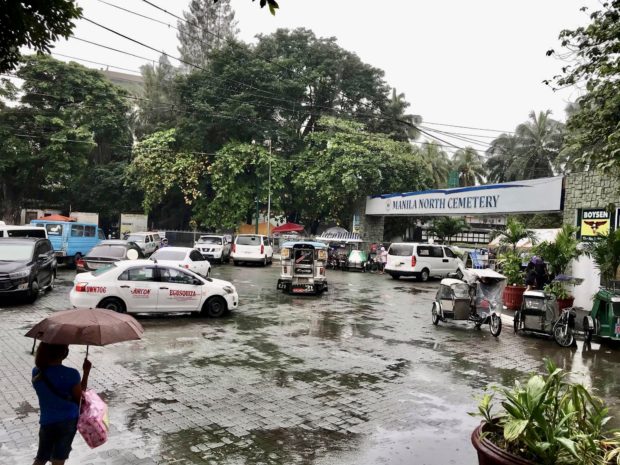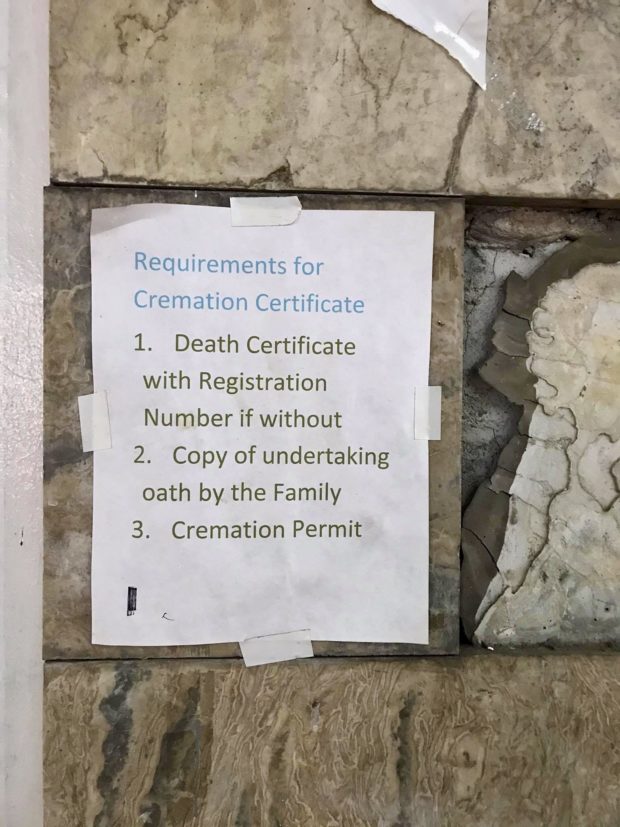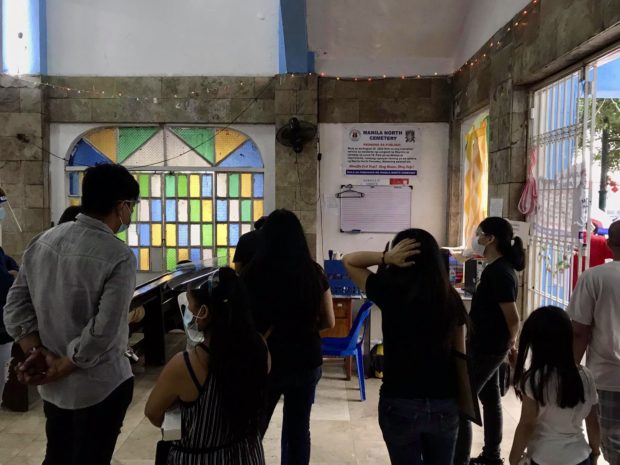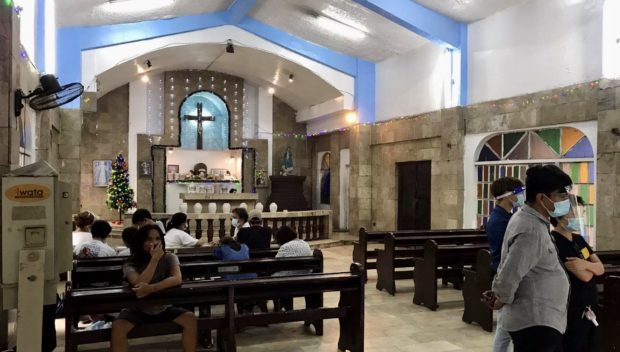Manila North Cemetery takes on cremations of city’s COVID-related deaths

Entrance to Manila North Cemetery this year, without the throng of visitors. INQUIRER.net/Cody Cepeda
(First of two parts)
The rain was hardly a deterrence for the visitors of Manila North Cemetery as they treaded toward the entrance on Tuesday morning last week. Metal railings had been erected on the driveway to maintain order in the ingress and egress of visitors. Security guards also lingered nearby.
Every person must pass through a misting tent and have their temperature scanned before proceeding inside the cemetery. Face shields and face masks are required, as is physical distancing. Visitors lax about following the rules risk being caught and apprehended by “COVID marshals” who patrol the grounds. This is, as in many areas of daily living, the reality now in COVID-19 times.
Unlike years past when cemeteries in the Philippines saw the rabble of visitors as early as Oct. 31, cemeteries this year would be temporarily closed to the public during Undas season, due to concerns about mass gatherings and COVID-19 transmission.
Manila North Cemetery, which spans 54 hectares, is only open to visitors from 8 a.m. to 5 p.m. and will be closed from Oct. 29 to Nov. 4.
Article continues after this advertisementWork, however, does not cease for the staff and workers of the cemetery during this time. Roselle Castañeda, OIC director of Manila North Cemetery, told INQUIRER.net that services such as burials and cremations would still continue.
Article continues after this advertisement
Manila North Cemetery’s cremation requirements. INQUIRER.net/Cody Cepeda
Opening the crematorium
Since Aug. 25, the cemetery has offered free cremations for COVID-related deaths among Manila residents.
Before this was implemented, families would have to buy or pay for the crude oil used in the cremation of remains, which costs about P5,000. Eventually, said Castañeda, the city government of Manila was able to find a way to shoulder the expenses of the crude oil as well, so that families now just have to bring urns for their departed loved ones.
The crematorium, which is located inside the cemetery’s Nuestra Señora de Salvacion Chapel, has actually been closed since July 2019 for renovation. The crematorium has already been weathered over the years; its walls were deteriorating and their only crematorium furnace was an old model from 2009.
But when COVID-19 hit, they had no choice but to open the crematorium again out of necessity and due to the urgency of the times.
“‘Yung nagkaroon po ng pandemic, kasi andami po talagang private crematorium na tumatanggi po sa mga COVID-related deaths. So, bilang kami lang po ang public crematorium, nagbigay po ng order si mayor na kailangan namin buksan ulit ang crematorium,” said Castañeda.
(When the pandemic came, there were a lot of private crematoriums which refused the bodies of COVID-related deaths. So, since we are the only public crematorium, our mayor gave an order that we need to reopen the crematorium.)
Manila Mayor Isko Moreno warned funeral parlors back in March 23 that they would be stripped of their permits should they refuse their services to those who died of COVID-19.
Moreno at the time did not specify what incident he was pertaining to, but said, “To all the funeral homes: I don’t want a repeat of an incident where a bereaved family would be abused while they are grieving. Don’t ever do that in these times.”
Castañeda said they had their lone machine repaired prior to opening again, but since it was already old, its functioning was not always as smooth as they hoped.
“‘Nung in-open namin ‘yan, ang incinerator machine namin isa lang… Minsan talagang titigok tigok siya, may times pa nga po na may one day nagloko siya, siguro, awa ng Diyos, umandar pa rin, napagbigyan pa rin kami dire-diretso,” she said.
(When we opened it, we only had one incinerator machine… Sometimes, it really lags. There was this one day that it malfunctioned, but maybe by the mercy of God, it still worked, as if we were granted the grace to operate that day.)
Manila North Cemetery eventually received help from the Rosita Soliman Foundation, which donated a new cremation furnace to them last May. Now, the crematorium has two working furnaces.

A family waits for the cremation of their relative. INQUIRER.net/Cody Cepeda
Handling bodies that perished from COVID-related causes
The crematorium opened on the last week of March to cater to COVID-related deaths, such as confirmed COVID-19 cases and “suspect” and “probable” cases.
Back in April, the Department of Health amended its classification of individuals for COVID-19. The DOH did away with the terms persons under monitoring (PUM) and patients under investigation (PUI), replacing them with the new terms “suspect,” “probable” and “confirmed.”
According to DOH’s new guidelines, an individual is considered “suspect” if they exhibit an influenza-like illness, like fever, coughing and sore throat. They also must have either traveled to a place where local transmission of COVID-19 was recorded in the last 14 days before symptoms occurred or had close contact with a “confirmed” or “probable” COVID-19 patient. Those who exhibit the symptoms and are either 60 years and above, a health worker, have a pre-existing medical condition or have a high-risk pregnancy are also considered “suspect.”
Meanwhile, a “probable” case is when an individual’s COVID-19 results are “uncertain” and if they were tested in an unofficial laboratory that performs RT-PCR tests. An individual is considered a “confirmed” case if their RT-PCR test comes out positive for COVID-19.
Castañeda said that the most hectic time for them in the crematorium was around the months of March to May, when they experienced receiving as much as 20 bodies. Nowadays, they would receive around two or four, sometimes seven.
“Ang dati po kasi ‘nung kaputukan ng COVID, ang nangyayari po kahit heart attack o cancer patient ka, o dati ka nang merong hika o may pneumonia ka talaga o nagd-dialysis ka, lahat po nakasulat, suspected COVID o probable COVID,” she explained.
(Before, at the height of COVID-19, even cases of heart attack, cancer, asthma and pneumonia are listed as suspected COVID or probable COVID.)
Thus far, there are 362,243 total COVID-19 cases in the Philippines, with 6,747 deaths, as of DOH’s COVID-19 tracker on Oct. 21. Manila City is third among the top provinces or cities when it comes to total deaths with 462, trailing behind Cebu City (663) and Quezon City (551).

Manila North Cemetery chapel where the bereaved await the cremation of their departed. INQUIRER.net/Cody Cepeda
The bereaved
Castañeda shared there are times when family members would come to them and express their wishes to have their deceased loved ones’ buried instead of cremated. Other times, they would request to open the cadaver bags to see or hug them, even though it is strictly not allowed.
There are also those who would return furious after receiving the swab test results of their deceased loves ones, discovering they were not positive for COVID-19.
“Sabihin man nilang malupit kami, minsan nasasabihan kami ng ganun… Babalik dito minsan ‘yung kaanak, nagagalit sa’min…” said Castañeda. “Meron pong iba syempre pinipilit hindi COVID, pero kasi kailangan sundin base sa death certificate, wala po kaming magawa. So ‘yung pamilya, humuhupa rin naman po ‘yung galit pagka andiyan na po.”
(Even if they say we are inconsiderate, for sometimes we are called that… Sometimes the relatives come back here, angry at us. There are those who would insist that theirs are not COVID cases, but we need to follow what is on the death certificate. We can’t do anything about that. Eventually, the family’s anger subsides.
“Ako minsan naluluha, kasi lalo na pag binalikan ako [tapos] wala palang — hindi COVID ‘yung parents nila. Wala po akong magagawa, kailangan po talagang sumunod.”
(Sometimes I get tearful, especially when a relative returns to me to say that their parents did not die of COVID-19, it turns out. I can’t do anything, we really need to follow the procedures.)
Castañeda understands that emotions can run high during these times and said they do not argue with the grieving families when they lash out.
“Hindi po namin sinasabayan ng galit o nakikipagtalo, nakikipagdebate sa pamilya. Pinababayaan ko lang silang magsalita, even ‘yung mga tao natin doon [sa crematorium], pinababayaan lang din sila,” she explained. “Hindi dahil sa hindi namin sila ine-entertain, kinakausap pa rin po namin, pero hindi na po kami nakikipagtalo.”
(We do not confront their anger with anger too, nor argue with them. We just let them speak, same thing with workers in the crematorium, they let the families speak. Not because we are not entertaining them, we still talk to them, we just don’t argue with them anymore.)
“Mahirap po kasing makipagtalo sa mga taong nagdadalamhati.” (It is hard to argue with people who are grieving.) JB
RELATED STORIES:
Hanging by a thread: PH garment industry takes on PPE-making, metes out retrenchments
Hanging by a thread: Cebu garment workers deal with pandemic dismissals
No ‘silver bullet’ solution: Tourism workers bear brunt of COVID-19 blow
For more news about the novel coronavirus click here.
What you need to know about Coronavirus.
For more information on COVID-19, call the DOH Hotline: (02) 86517800 local 1149/1150.
The Inquirer Foundation supports our healthcare frontliners and is still accepting cash donations to be deposited at Banco de Oro (BDO) current account #007960018860 or donate through PayMaya using this link.